Selecting a swimming pool for your home can be a lot more stressful than planned. Home pools come in a variety of shapes, sizes, styles, and designs. The following factors can make deciding what type of pool to get easier:
- Lot size
- Space
- How the land lays
- Your home’s style
- Whether you want sun exposure or shade
- Safety codes
- Purpose
- Budget
Do you plan to use your pool as part of your fitness routine, is it just for the aesthetic, or is it for lounging and guests? These are all things you must consider before making the big purchase. To begin, here’s a breakdown of all the options you must narrow down from.
What Are the Different Types of Swimming Pools?
Rectangular Pool
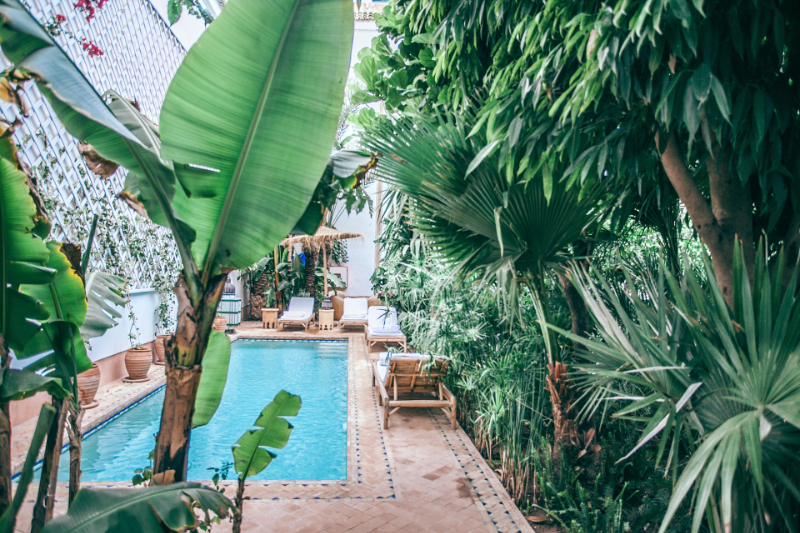
The most classic residential pool is in rectangular form. It’s practical, and it looks, well, like a “normal” pool. It’s great for swimming laps or just for lounging. A rectangular pool normally holds a decent number of people, making it ideal for families and to host friends.
If you have a traditional home, then a rectangular pool won’t take away from the elegance of the property. This type of swimming pool is also great for nontraditional-looking homes, as it is ageless, will never go out of style, and matches any setting. Also known as a lap pool, it can be any length and width you would like it to be based on what you intend to use it for.
Kidney-Shaped Pool
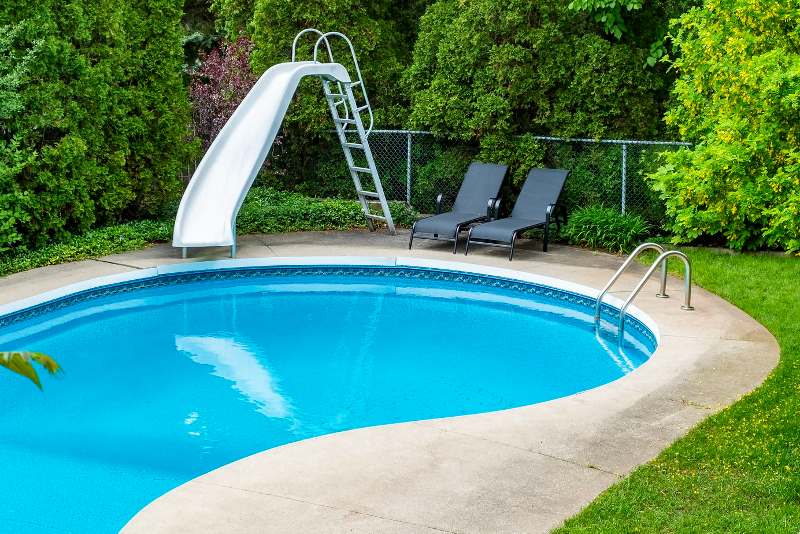
The first kidney-shaped pool was built in 1948 for a mid-century modern style of home. It’s perfect for maintaining the historical style of a mid-century modern home. A kidney-shaped pool is curved with an indentation on one side and is highly versatile, offering various functions.
These pools are perfect if you have young children, as there is a natural division between the deep end and the shallow end. Lap swimming is also possible in these pool shapes. A kidney-shaped pool can be installed if you’re on a budget, as the curved design allows for more square footage of the swimming area with lower perimeter footage (which costs more to build).
Roman Pool
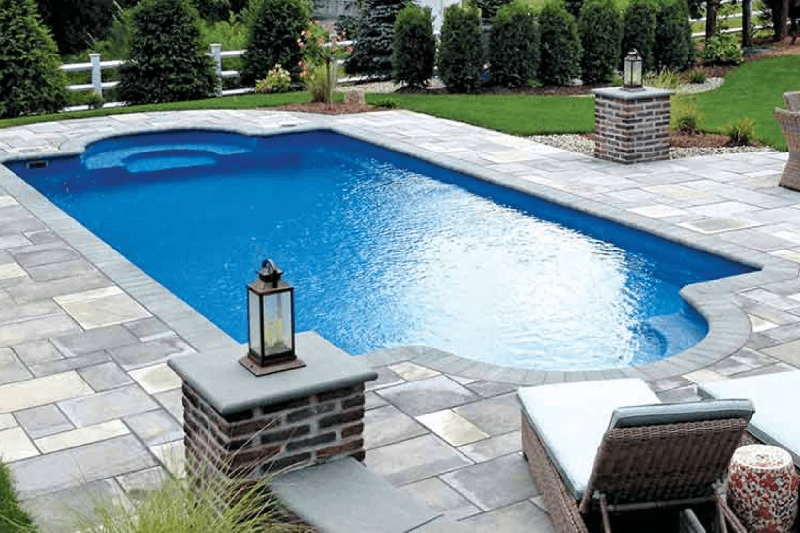
A Roman pool is a variation of a rectangular pool. Both are formal and both are classics. A Roman-shaped pool has an arch at one or both ends of a rectangular pool. One arch is a Roman pool and two arches (one on each side) is a double Roman pool. They blend in well with most homes, but especially those that have classical and formal backyards. However, Roman pools can blend in well with modern homes and even rustic settings, too.
What Materials Are Used?
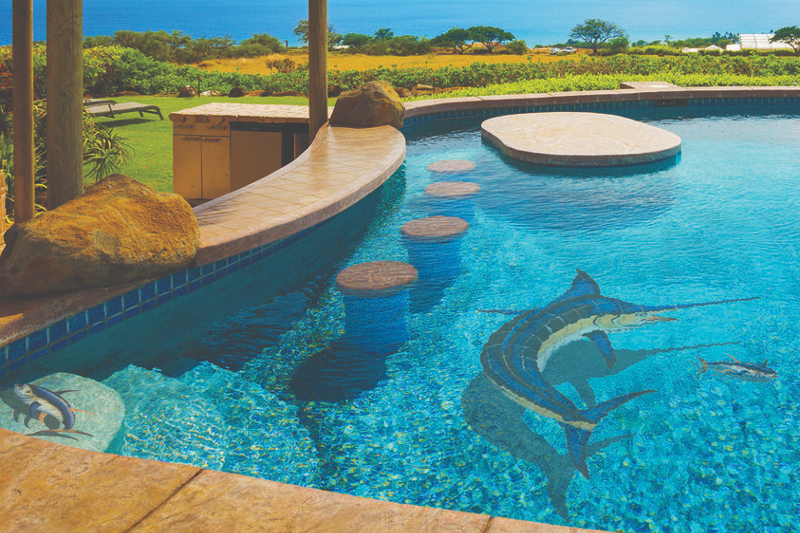
Another important under-the-radar aspect when choosing a home pool is selecting the building material. There are three basic materials for in-ground pools: concrete, fiberglass, and vinyl. Each material has its own pros and cons, so be sure the design you want can be created using the material you choose.
Concrete is the most compliant material for designing your pool shape and style. It’s ideal for any custom design, and you can even enhance it with a finishing material like glass tile, colored plaster, or stone aggregate. Like concrete, vinyl is great for all types of swimming pool designs. The patterns and colors are endless, which gives you an assortment to choose from for the pool’s interior. Fiberglass pools come in a variety of colors, shapes, and styles. They are easy to customize by adding ceramic tile, jets, and mosaics.
What Type of Pool System Is Best?
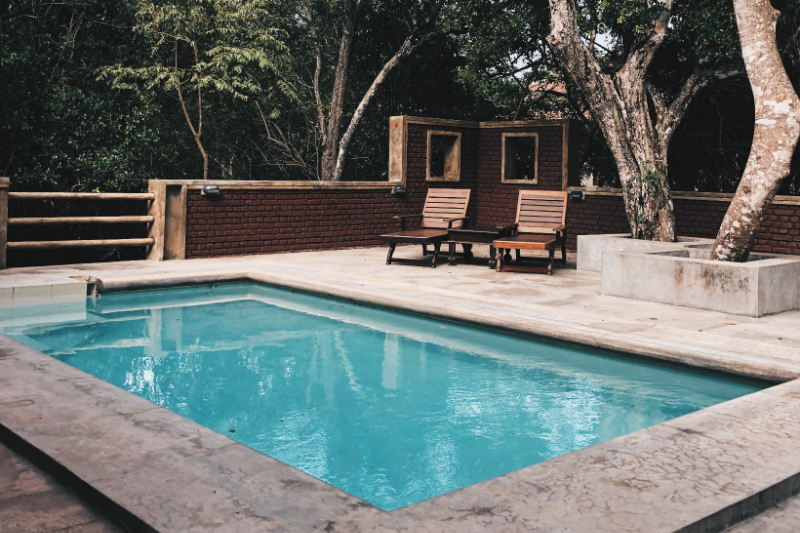
Saltwater and chlorine systems are two of the most common pool sanitization systems.
Saltwater Systems
This may come as a surprise, but saltwater systems are not chlorine-free. All saltwater systems come with a chlorine generator. You add pool-grade salt to the water and the generator converts the salt into chlorine, which then sanitizes the water. So even though it’s a saltwater pool, there is chlorinated water; it’s just a lot less than in a normal chlorine system.
A few benefits of a saltwater system include:
- The water has a softer quality
- It doesn’t require harsh chemicals
- It has a significantly lower level of chlorine (no chlorine scent either)
- It requires lower maintenance because the system naturally prevents algae growth
There are also health benefits to saltwater pools. The water is gentler on the skin, eyes, and hair as opposed to chlorine from a chlorine system. There’s also no need to worry about fading swimwear due to chlorine. Pool-grade salt is also less expensive than chlorine and the chemicals that are needed with it.
The downside to a saltwater pool is that it will corrode any metal objects in and even near the pool, such as furniture and grills, and even natural stone, like any paving near the pool. Fiberglass pools are the most resistant to wear and tear from saltwater exposure.
Also, keep in mind that chlorine generators are not cheap and need to be replaced by a professional within three to seven years. You will also need to run your pool filter 24/7 to generate enough chlorine to clean the pool, which can put a dent in your energy bill.
Chlorine Systems
Chlorine systems need larger amounts of chlorine to sanitize your pool water. These systems require you to manually add store-bought chlorine to the water. They also need to be tested once or twice a week to maintain the correct chemical balance in the water. Once you determine the chemical balance, you need to add chlorine and other chemicals. Chlorine systems have few upfront costs, no chlorine generator is needed, and no professional is needed to test the water.
Chlorine also doesn’t cause major damage to pool parts, but may cause damage (bleach) to swimsuits. Because these pool systems rely heavily on chemicals, certain health risks are involved. Chlorine can cause irritation to the eyes and skin. It can burn the eyes and dry out the skin. Obviously, there’s also the smell of chlorine you have to endure. Although there are no major upfront costs, chlorine pools do require constant purchasing of chlorine and other harsh chemicals that you must handle and expose yourself to.
Get inspired by your own property and what shape fits it best and remember to consider what material will be best to construct the pool design you have in mind. In the end, your pool needs to be how you envision it. Your home, the pool, the outdoor furniture, and the landscaping must all be in sync for your ideal in-ground pool to work.


